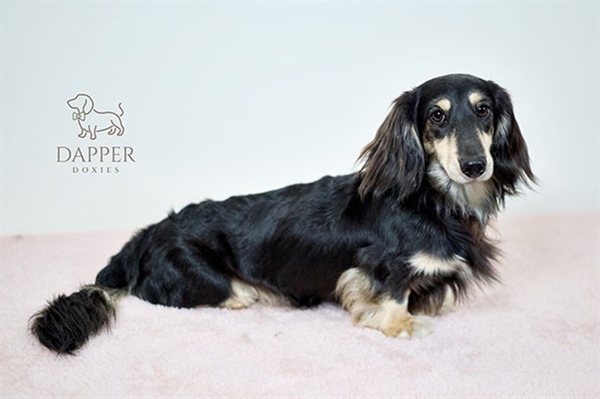What Is the Best Diet for a Dachshund Puppy?

If you’ve ever watched a Dachshund puppy wiggle their way across a room like a tiny sausage rocket fueled by joy, then you already know — these little dogs are pure delight! With their floppy ears, curious noses, and playful personalities, it’s easy to fall head-over-heels for these adorable pups.
But while your Doxie might think leftover pizza crust or a rogue sock is an acceptable snack (Spoiler: it’s not!), feeding your Dachshund puppy the right food is one of the most important ways you can ensure a long, happy, and healthy life.
Whether you’ve just welcomed home a wirehair or longhair pup, or you’re prepping for your future fur baby’s arrival, let’s break down everything you need to know about feeding your Doxie right from day one.
The Foundation of a Healthy Dachshund Puppy Diet
Dachshund puppies may be small, but their nutritional needs are mighty. They require a balanced diet rich in protein, fat, vitamins, and minerals to support their rapidly growing bodies and high energy levels.

Because they’re prone to certain health concerns, like obesity, joint problems, and food sensitivities, it’s essential to start them off on the right paw. A high-quality puppy food specifically formulated for small breeds is your best option. These recipes contain the correct ratios of nutrients for development while accounting for their smaller jaws and unique metabolisms.
Avoid foods with artificial additives, by-products, or excessive fillers, and instead look for real meat as the first ingredient, along with a good balance of healthy fats and digestible carbs. Potential consequences of an unbalanced diet? Think upset tummies, stunted growth, poor coat quality, allergies, and even long-term orthopedic issues.
But don’t worry — we’ve got you covered with everything you need to know about creating the perfect diet plan for your Dachshund puppy!
Should Dachshund Puppies Eat Grain-Free Food?
Grain-free diets have gotten a lot of buzz in the dog world, but they’re not always the right fit for every pup. Unless your Dachshund has a diagnosed grain allergy (which is rare), there’s usually no need to avoid grains altogether.
Whole grains, such as brown rice, oatmeal, and barley, are often easier for puppies to digest than heavy fillers like corn or soy, and they can provide fiber, vitamins, and sustained energy.
In fact, the FDA has investigated potential links between grain-free diets and heart conditions like DCM (dilated cardiomyopathy), so talk to your vet before cutting grains from your puppy’s diet.
Bottom line? A well-balanced, veterinarian-approved food — grain or no grain — is what matters most.
How Often Should I Feed My Dachshund Puppy?
Tiny bodies, tiny tummies! Dachshund puppies should be fed smaller meals more frequently to keep their blood sugar stable and their bellies satisfied. Here’s a general schedule to use as a reference:
-
8–12 weeks old: 4 meals per day
-
3–6 months old: 3 meals per day
-
6 months and up: 2 meals per day
Stick to consistent mealtimes and avoid “free feeding” (leaving food out all day), as Dachshunds are notoriously prone to overeating, and that cute little belly can balloon quickly into an unhealthy one.
Can Dachshunds Have Food Allergies?
Yes, they absolutely can. While not as common in young puppies, Dachshunds — especially as they grow older — may develop food sensitivities or allergies. Signs to watch for include:
Common culprits include beef, chicken, dairy, wheat, and soy. If you notice any of these symptoms, work with your veterinarian to identify the allergen and transition to a limited-ingredient or hypoallergenic diet as needed.
What Treats Are Safe for Dachshund Puppies?
Who could resist rewarding those soulful eyes and sassy struts with a treat or two? While treats can be an essential part of training and bonding, moderation is key. Treats should never exceed more than 10% of your puppy’s daily calorie intake.
Some safe treat options can typically include:
-
Soft training treats made for puppies
-
Freeze-dried meats (like chicken or lamb)
-
Tiny pieces of cooked carrots or green beans
-
Puppy-specific dental chews (always size-appropriate)
Just be sure to avoid sugary snacks, fatty table scraps, or anything with artificial colors and flavors. And steer clear of toxic foods, like chocolate, grapes, raisins, onions, and xylitol.

How Do I Switch My Dachshund Puppy’s Food Safely?
Whether you’re transitioning from breeder-provided food or switching to a new brand, gradual is the name of the game. Sudden changes can cause upset stomachs, loose stool, and general puppy crankiness. Follow this simple 7-day switch plan:
-
Days 1–2: 75% old food, 25% new food
-
Days 3–4: 50% old food, 50% new food
-
Days 5–6: 25% old food, 75% new food
-
Day 7: 100% new food
Keep an eye on your pup’s digestion during the transition, and always consult your vet if anything seems off.
Healthy Bellies, Happy Hearts: Adopt a Well-Loved Doxie Today!
At Dapper Doxies, we’re more than just passionate Dachshund breeders — we’re proud puppy parents who care deeply about helping every pup get the best start in life. That’s why all of our puppies go home with a strong nutritional foundation, personalized feeding plans, and expert guidance for their new families.
Our miniature longhair and wirehair Dachshunds are raised with love, socialized in our home, and held until they’re at least 10–12 weeks old to ensure they’re healthy, confident, and ready to thrive. And yes — each pup is genetically tested, microchipped, vaccinated, and comes with care instructions tailored to their specific needs, including dietary requirements.
Ready to bring home a healthy, happy Doxie? Contact Dapper Doxies today to learn more about our available litters and adoption process. Let’s find the perfect puppy for your heart — and your home!